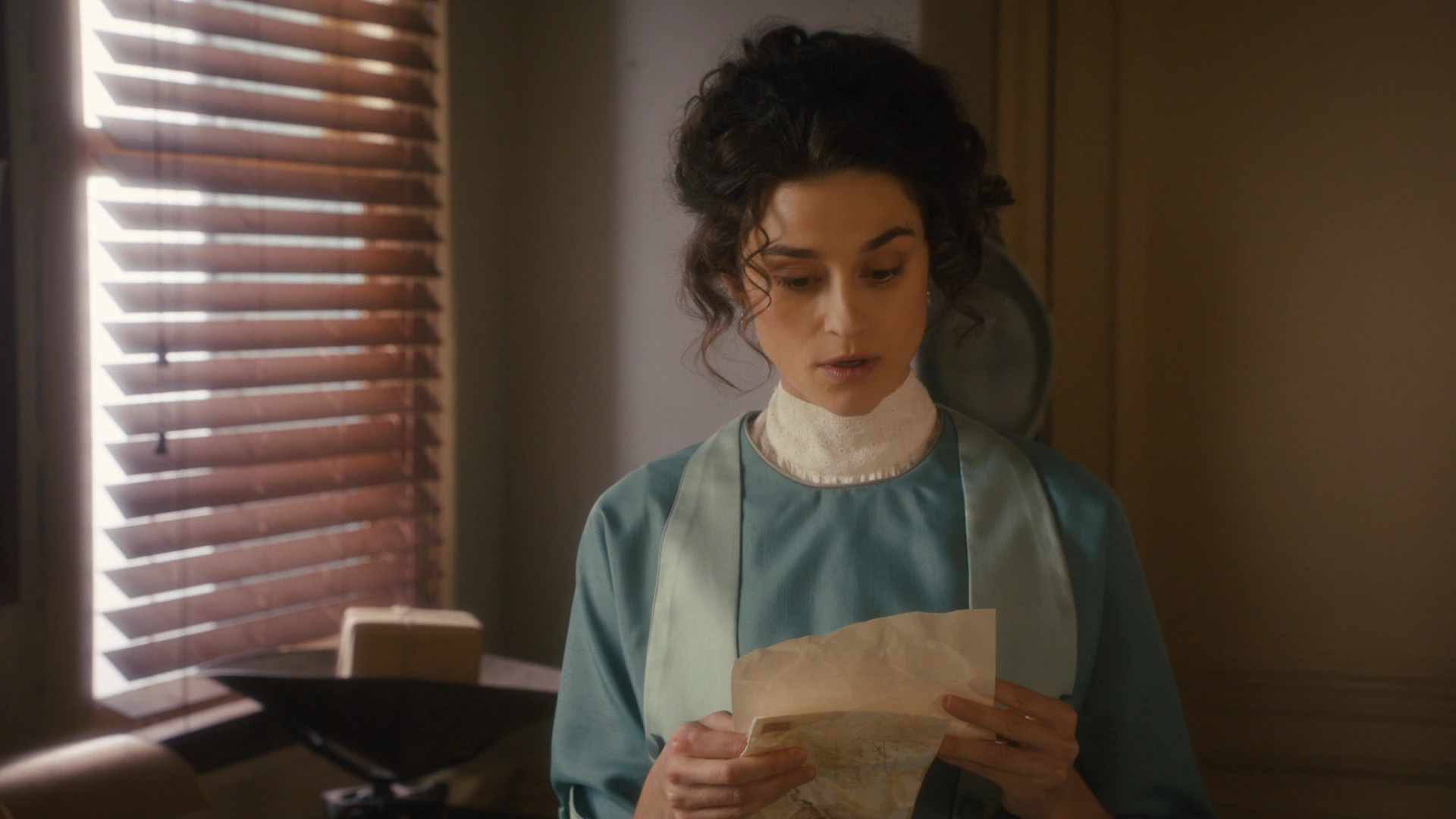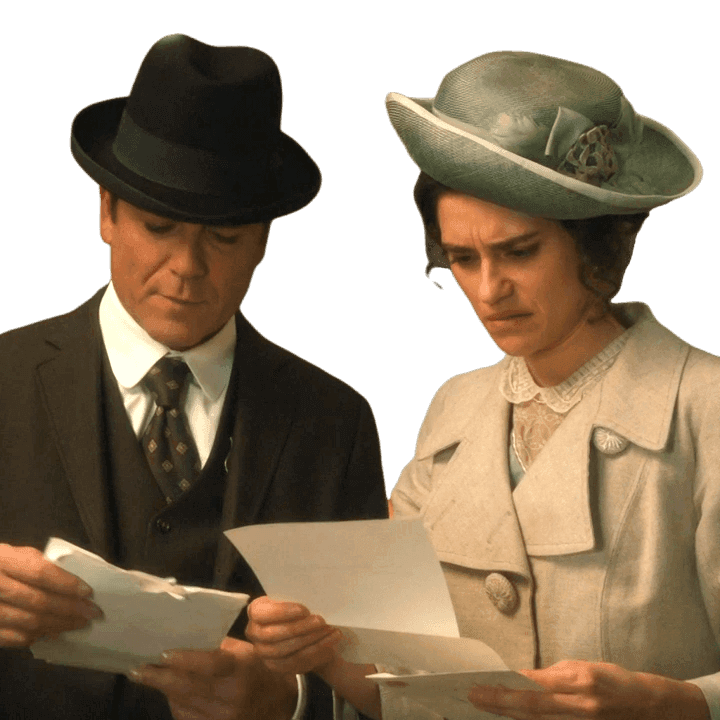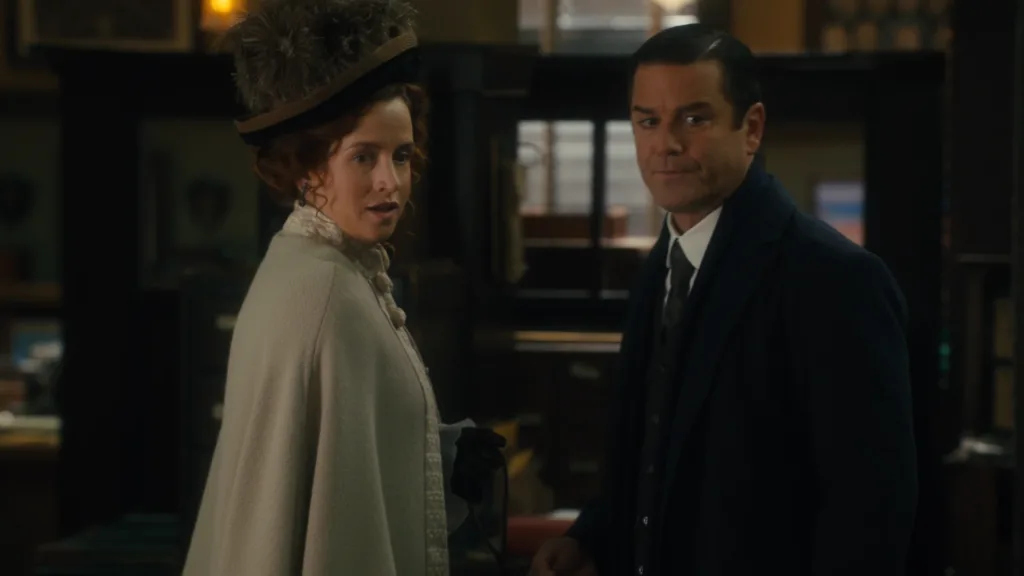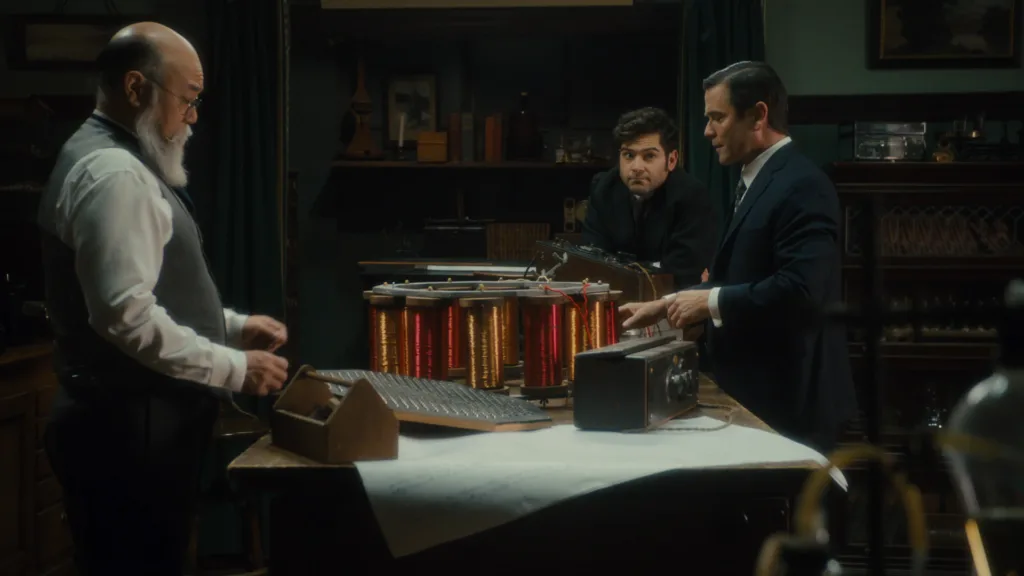S18 E20 – Going Postal
“I could manage just fine when I knew that her time in London had a specific end”

Spoiler Warning: Do not read on if you haven't watched this episode!!
The writers of Murdoch Mysteries were thrown a curveball when Hélène Joy decided to take a sabbatical and drastically reduced her appearances on the show. Julia Ogden’s absence compounded the logistical nightmare of actor and location availability, which is the everyday reality for this production. Yet, as we see in Going Postal, it also opened up opportunities to add more depth and complexity to William Murdoch’s (Yannick Bisson) character, turning what was necessitated by circumstances into strength.
Writing for this show must be like creating a jigsaw puzzle from scratch, where you not only have to design the individual pieces yourself but also ensure they fit together harmoniously. The very talented Keri Ferencz has done exactly that. She has taken Julia’s continued absence and constructed a narrative around it, where Murdoch’s coping mechanisms, the theme of adultery, the motivations of both main and supporting characters, and the murder mystery are completely integrated. This is brilliant writing, enhanced by brilliant acting—more on that later. And if the audience is shouting “nooooooo” at their televisions, all the better.
Emotional Struggles
Mysteries are great vehicles for exploring the human condition, focused as they are by definition on human shortcomings. And although Murdoch is a better man than most, he is still a flawed human being like the rest of us. So, when his neighbour Tippy Longfellow (Rebecca Liddiard) offers him a scintillating case along with her fangirling over him, just as he is reeling from Julia’s letter, he doesn’t need much convincing to investigate a dead letter threatening an unknown recipient.
As Tippy showers him with attention and the case touches on the why and how of committing adultery, Murdoch’s inner life is brought to the forefront. Yannick Bisson shines in the scenes where Julia’s communications deliver one gut punch after another—tremendously aided by the repeated variations on Robert Carli’s William Remembers, the music that played most notably when William and Julia finally chose each other in the Season 5 finale Twentieth Century Murdoch. In true William Murdoch fashion, we see the psychological drama not spoken out loud but written on Yannick’s expressive face, saying more than a thousand words of dialogue ever could.
Also in true William Murdoch fashion, we don’t see him acknowledge how hurt and upset he must be by Julia’s rejection. Interestingly, it’s through the interactions with his good friend George Crabtree (Jonny Harris) that we see just how lonely he has been and how empty his life is without his wife and daughter by his side. No wonder he starts to succumb to the attentions of a pretty girl who idolizes him. Ferencz’s writing and Bisson’s acting work together here to show how, step by step, Murdoch goes from not even noticing Tippy’s flirting, to enjoying getting his ego stroked, to realising how this must look to his friends and colleagues, to contemplating adultery and how to reconcile that with his faith, to checking out her nightgown-clad form, to almost kissing her—saved by the gunshot—then sharing a regretful but resigned look that recognises what might have been but now will never be.
Wonderfully Elusive and Ambiguous
Please forgive me a moment of self-indulgence as I quote from my review of Only Murdoch in the Building, the episode where we first met Tippy Longfellow: Tippy Longfellow was a wonderfully weird guest role, and I hope to see lots more of her. I don’t believe her obsession with Murdoch will abate anytime soon. Boy, was I right! She is obviously still very much enamoured with Murdoch, although we never find out whether she has been waiting for a chance to rope him in with an alluring mystery or if she’s genuinely guileless and motivated by the desire to save a life. She’s a wonderfully elusive and ambiguous character; even when she changes into something more comfortable—now that’s a classic seduction line if ever I heard one—we still can’t be sure if she’s trying to seduce Murdoch or if she simply believes she is thinking of Billy Randall’s (Dylan Hawco) safety. Of course, two things can be true at the same time.
Rebecca Liddiard portrays her as an enthusiastic, somewhat ditzy young woman (I must say I am quite tickled that you invited me to lunch / I-I’m sure I said we should meet outside) who exudes screwball comedy charm and is wholly unaware of societal norms or propriety. She’s also completely unabashed about telling him she knows what his favourite food is because of an educated guess based on what I’ve seen in your trash. Murdoch is either unaware of or willing to overlook her manipulations, as she makes him feel seen, believes he’s a genius, and is so obviously attracted to him. As he kicks in the door, she says, ooh, that was incredible, which must be early 20th century Canadian for the 🔥 emoji.
Murdoch and Longfellow are not the only well-written and well-acted roles; I especially liked the three clients (played by Lauren Collins, Allegra Fulton, and Stephanie Moore). All strong, if a bit delusional, women, each had her own motivation for exchanging… ah, companionship for money with Randall. In contrast, Randall doesn’t seem to have much of a personality, and aside from his stamina, it’s unclear what these ladies saw in him. Perhaps that was the point: he could be a blank canvas for them to write on. We don’t get to see it, but he must be quite something for all those women to go to such lengths on his behalf.
Can’t Just Rinse and Repeat
Now, I’m sure there are Murdoch Mysteries fans reading this who think, “That’s all well and good, but I just want Julia back, and I don’t care one iota about William’s character development.” Like Murdoch says, I could manage just fine when I knew that her time in London had a specific end. (Same, William, same). While I would love to see Hélène Joy return as one of the principals, I also recognise that it wouldn’t be much of a drama series if nothing ever changed. Eighteen years is a long time to simply repeat the same storylines over and over.
I will say, it’s been a long time since the audience has been so invested in the Jilliam story. Just like Julia leaving William in Season 3 and marrying Darcy Garland in Season 4, this decision will be hotly debated for years to come. Plus, we don’t know if Julia will stay in London for another year. We’re obviously meant to think that Hélène will not be back, but we have two more episodes to go this season, and a lot could change in that time. Regardless, I’ll happily go wherever the writers decide to take us next.
Let me end by telling you what I think might happen (well, not really, but it’s fun to speculate). I’m basing this on the very short letter Julia sent, the even colder telegram that followed it, her not allowing William to join her in London and William simply accepting her decision, and the mention of Ralph Fellows’ unknown whereabouts in the one of the previous episodes: Tippy turns out to be the daughter of Ralph Fellows, who has escaped once again. They are conspiring by writing fake letters and telegrams from Julia (Tippy is, of course, perfectly placed for this with her post office job) to ensure that Murdoch will be unhappy and susceptible to Tippy’s charms. However it ends, there are sure to be fans all over the world going postal over this season: mission accomplished.




I’m sick of Ralph Fellows!! Please get rid of him once and for all.